As it was in the Aquino administration, so it is under the Duterte administration: it is still a race against time for the Bangsamoro.
There are only 48 days left between March 31 and May 18, the target date for the Bangsamoro Transition Commission (BTC) to complete its draft Bangsamoro Basic Law (BBL) for submission to President Rodrigo Duterte so he can study it before it is sent to Congress, and 115 days to July 24, the second State of the Nation Address (SONA) where he is expected to certify the bill as urgent.
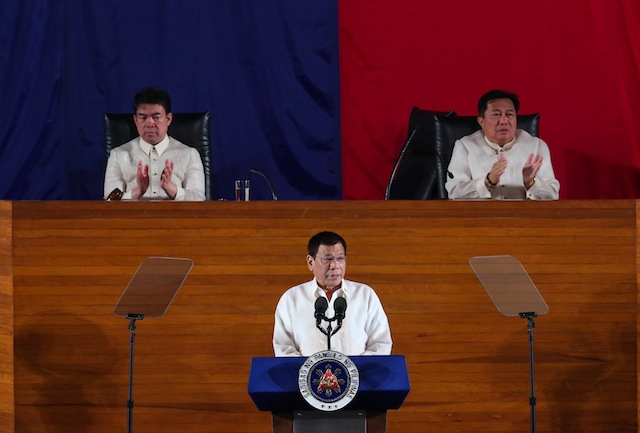
Senate President Aquilino Pimentel III (L) and Speaker Pantaleon Alvarez, Jr., (R), Senate President Aquilino Pimentel III, applaud as President Rodrigo Duterte delivers his first State of the Nation Address on July 25, 2016. ACE MORANDANTE / PPD
Duterte’s leaders in Congress, fellow Mindanawons like him — Senate President Aquilino Pimentel III and House Speaker Pantaleon Alvarez, Jr. — have both given their assurances that they would attend to the passage of the Bangsamoro law immediately.
Pimentel told MindaNews on February 28 that the BTC “should now start working” and work “double time” to submit their draft to Congress by July, adding that passing a “bill into law is easier than (shifting from) old Constitution to new Constitution,” referring to the moves to shift to a federal form of government.
Alvarez was more emphatic. He told MindaNews on March 27 that as soon as the draft BBL is submitted to them, “we will make it our priority.” If the President certifies the bill as urgent, he is confident he could push for its passage immediately. “Conservatively, sa House.. give me a month or two,” he vowed.
But can the BTC deliver given the time constraints as well as financial constraints (the Department of Budget and Management has yet to release its budget)?
On March 11, Duterte surprised those keenly monitoring the Bangsamoro peace process, when, addressing the Moro Islamic Liberation Front (MILF) during the inauguration of the People’s Television (PTV) Cordillera Hub in Baguio City, he said, “you’re about to complete the Bangsamoro Transition draft. I will study it before we submit it to Congress and pray that it would sail on still waters.”
“Hopefully not stillbirth,” quipped a young Moro leader.
In reality, the BTC has not started drafting as it has yet to adopt its internal rules, decide on their working draft and set up its committees during its April 3 to 5 session in Cotabato City. And as of March 30, it was still waiting for the DBM to release its funds.
Without funds, the work of the MILF-led 21-member all-Moro body composed of 11 nominated by the MILF and 10 by the government, will, expectedly be further delayed.
Costs of delay
The BTC was able to hold its first session on March 6 and 7 in Cotabato City with the assistance of a funding agency. In that session, the commissioners discussed internal rules, and approved their proposed budget.
On March 8, BTC Executive Director Esmael Pasigan sent a letter to Budget Secretary Benjamin Diokno, attaching Resolution 01 dated March 7, signed by all 21 members, endorsing to DBM the
request for release of budget.
.
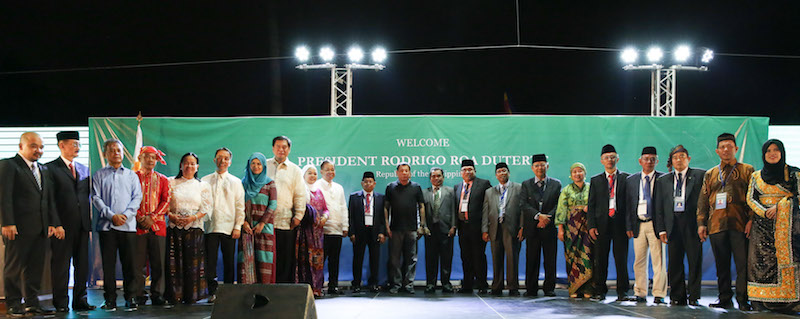
The 21 members of the Bangsamoro Transition Commission (BTC) with President Rodrigo Duterte (center) at the launch on 24 February 2017 at the Garden Pavilion of the Waterfront Insular Hotel. TOTO Lozano / Presidential Photo
The delay in the passage of the BBL will affect the timetable not only of the establishment of the new autonomous political entity that would replace the Autonomous Region in Muslim Mindanao (ARMM) but also the process of decommissioning firearms and combatants of the MILF’s Bangsamoro Islamic Armed Forces (BIAF).
The Comprehensive Agreement on the Bangsamooro (CAB) provides that when the BBL is ratified, 30% of the forces and weapons would be decommissioned, 35% more in the third phase and the last 35% in the fourth phase.
Thus far, only 55 high-powered and 20 crew-served weapons of the MILF’s BIAF was turned over to the Independent Decommissioning Body on June 16, 2015 in ceremonial rites in the presence of then President Benigno Simeon Aquino III and MILF chair Al Haj Murad Ebrahim. Only 145 members of the BIAF have been decommissioned during the symbolic rites.
Decommissioning by phases is tied up with the political milestones that the two parties have to accomplish and the passage of the BBL is a key to speeding up the process.
As of June 2015, the MILF’s BIAF had an estimated 10,000-strong armed force.
Aside from the delay’s impact on decommissioning, if the draft BBL is not submitted to Congress before the July 24 SONA, the two Houses of Congress will expectedly be swamped by other priority bills — as well as the moves to amend the 1987 Constitution to shift to a federal from of government.
Next year, a pre-election year, is expectedly a year of shifting political alliances, and unless a Bangsamoro law is passed, the ARMM elections will proceed as scheduled in May 2019.
“Too ambitious”
Mohagher Iqbal, chair of the Peace Implementing Panel of the Moro Islamic Liberation Front (MILF) and member of the BTC, acknowledged in a press conference here Wednesday at the 3rd anniversary celebration of the signing of the Comprehensive Agreement on the Bangsamoro (CAB) that while they would exert “best efforts,” the May 18 deadline proposed by the government, he conceded, is
“too ambitious.”
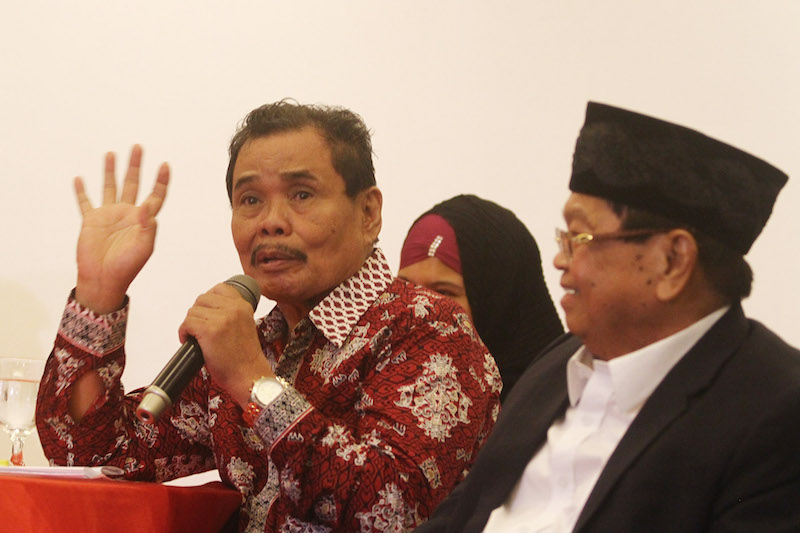
Mohagher Iqbal, chair of the MILF’s Peace Implementing Panel sits beside Ghazali Jaafar, chair of the Bangsamoro Transition Commission at the commemoration Wednesday (March 29) of the third anniversary of the March 27, 2017 signing of the Comprehensive Agreement on the Bangsamoro MINDANEWS PHOTO
Iqbal knows whereof he speaks. He was chair of the then 15-member BTC which drafted the BBL from April 2013 to April 2014, submitted it to the Office of the President in April 2014 for review that took two months, only for the BTC to reject it, leading to a series of negoitations at level of the GPH and MILF peace panels before then Executive Secretayr Paquio Ochoa stepped in to direcdtly deal with the MILF until a compromise draft, referred to as “agreed version,” was submitted to Congress on September 10, 2014.
After several committee hearings that were further delayed by suspension due to the Mamasapano Tragedy of January 25, 5015, the Ad Hoc Committee on the Bangsamoro Basic Law chaired by Cagayan de Oro Rep. Rufus Rodriguez, filed its substitute bill, HB 5811 and the Senate’s Local Govenrment Committee under Senator Ferrdinand Marcos, Jr. filed SB 2894 — both titled “Basic Law for the Bangsamoro Autonomous Region” (BLBAR) in June and August 2015, respectively.
But the MILF peace panel and even its counterpart in the government peace panel said BLBAR “would render the future Bangsamoro less autonomous than the ARMM that it seeks to replace.”
Congress under the Aquino administration adjourned in February 2016 without passing a Bangsamoro law.
Unlike the Iqbal-led BTC, the expanded BTC now under Ghazali Jaafar, the MILF’s 1st Vice Chair, is not going to begin from zero as they have working drafts to choose from such as the “agreed version” or what became House Bill 4994 and Senate Bill 2408.
Jaafar and a number of the commissioners from the GPH and MILF are looking at the “agreed version” as the working draft.
Nur’s race against time, too
While the GPH-MILF peace process has been hounded by delays (it took three months after President Duterte signed the Executive Order on the BTC for the 21 commissioners to be named), the peace implementing panels of the government and Moro National Liberation Front (MNLF) under founding chair Nur Misuari have yet to formally meet.
Nabil Tan, Deputy Presidential Adviser on the Peace Process and chair of the government’s peace implementing panel dealing with the MNLF-Misuari, said he has met four times, informally, with the MNLF’s panel chair, Randolph Parcasio, the latest on March 28.
Tan told MindaNews that the panels will not have a formal launch as the BTC did on February 24 here but they will make a formal call on President Duterte within the first half of April.
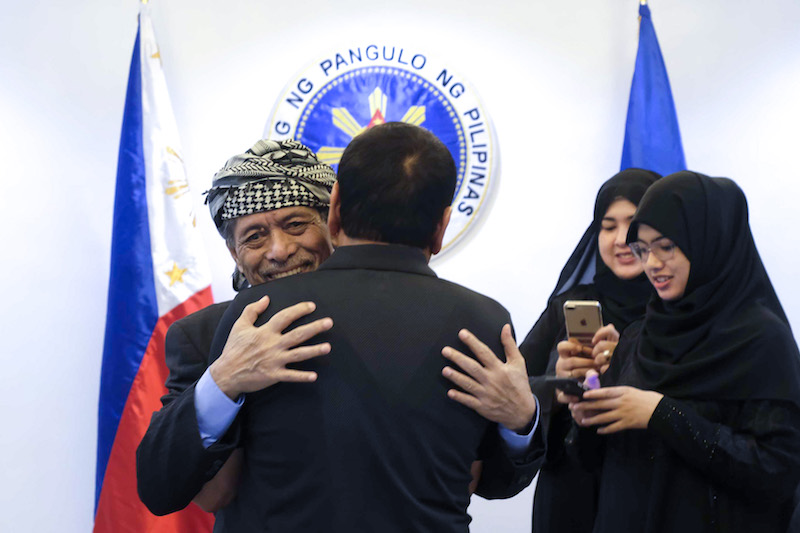
President Rodrigo Roa Duterte meets with Moro National Liberation Front (MNLF) founding chair Nur Misuari at the Presidential Guest House in Davao City on March 27, 2017. No details about the meeting were released. RENE LUMAWAG/Presidential Photo
It is also a race against time for the MNLF-Misuari. Tan said that by April 27, Misuari’s temporary liberty will have lapsed.
Judge Ma. Rowena Modesto-San Pedro of the Pasig Regional Trial Court in Pasig City on October 27 last year granted the “motion to suspend proceedings and enforcement of warrants of arrest against Misuari” for a period of six months from October 27, to allow Misuari “to attend peace talk sessions with the government.”
April 27 is fast approaching but Parcasio is confident Misuari’s temporary liberty will be extended. “Well, we could always file a motion for extension … because his leave is tied to the peace process. It’s tied to the fact that he’s given time to travel, to meet different people, to consult MNLF members, confer with government in connection with the peace process, so we are confident that hopefully the court will grant the extension,” Parcasio told MindaNews.
Parcasio is confident they can finish their task in a month because they have already drafted the amendments to RA 9054, based on the consensus points with the Arroyo and Aquino administrations under the Tripartite Review of the implementation of the 1996 Final Peace Agreement, and only need to resolve with the Duterte administration the three remaining issues on strategic minerals, territory and transitional mechanism.
Converge, Harmonize
Jesus Dureza, Presidential Adviser on the Peace Process, announced in November when he set up the peace implementing panels of the GPH and MNLF-Misuari, that it would be up to Congress to converge the drafts, a move described by Moro leaders from the revolutionary fronts, government and civil society as “disastrous.”
Under the Bangsamoro Peace and Development Roadmap proposed by Dureza’s office and approved by the President in July, the BTC was to be expanded from 15 to 21, supposedly to make the drafting body “more inclusive” by including the MNLF, including Misuari’s faction so it could produce a “converged” or “harmonized” draft Bangsamoro law.

President Rodrigo Roa Duterte signs the Executive Order reconstituting the Bangsamoro Transition Commission in Malacañan on November 7, 2016. Also in photo are Moro Islamic Liberation Front (MILF) Peace Implementing Panel chair Mohagher Iqbal, Presidential Peace Adviser Jesus Dureza, MILF Chair Al Haj Murad Ebrahim, and Government of the Philippines (GPH) Peace Implementing Panel chair Irene Santiago. KING RODRIGUEZ/Presidential Photo
The GPH-MILF’s BTC is drafting a law that will pave the way for a new autonomous political entity that would replace the ARMM. The peace agreement provides that when the BBL is ratified, the ARMM is deemed abolished and the Bangsamoro Transition Authority (BTA) will take over until the first set of officials of the new Bangsamoro government is elected. The GPH-MNLF-Misuari on the other hand is working on amendments to strengthen the ARMM.
Pimentel told MindaNews it would be ideal if the Moro fronts do the convergence of the drafts into one proposed law for submission to Congress but if the fronts are not willing to cooperate, “then somebody has to do the harmonization or the reconciliation. It could be the Office of the President, walang masama doon (nothing wrong with that) or it could be Congress.”
Alvarez is of another view. He told MindaNews Dureza “should do a good job” in getting the two fronts to agree. “Magaling naman si Secretary Dureza, I hope kung saan sila pwede magtagpo, na magkasundo, kung halimbawa there is a need to create under a federal system two states sa ARMM,” then they would consider that.
Alvarez has proposed 14 states for a federal Philippines, five of them in Mindanao, including two Moro states for the predominantly Moro islands — Basilan, Sulu and Tawi-tawi — and another for the mainland — Maguindanao and Lanao del Sur.
“Squandered opportunity”
There is another entity that has been pushing for the MNLF and MILF to unite and “harmonize” the peace agreements — the Organization of the Islamic Cooperation which gave the then undivided MNLF an observe status in 1977. The OIC, had, in fact, brought leaders of the Moro fronts — including Misuari, Murad and Muslimin Sema — to several meetings through the Bansgsamoro Coordination Forum.
But several Moro leaders concede that it is the country’s first Mindanawon President who can muster his political will to bring the leaders of the fronts to come to an agreement.
Retired Prof. Rufa Guiam told MindaNews she expected Duterte would have done that instead of set
them apart by creating separate implementing panels.
.
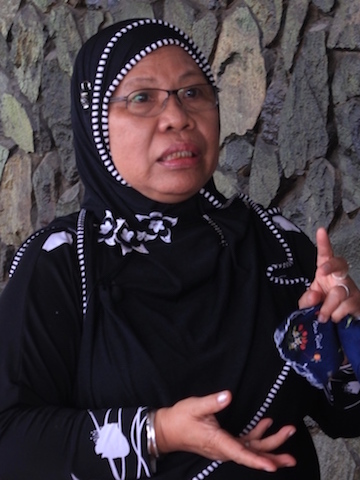
Prof. Rufa Cagoco-Guiam says President Duterte could have asked leaders of the Moro revolutionary fronts to get their act together for the sake of the Bangsamoro. MindaNewa photo by GG Bueno
“As a President riding high on a popularity vote and perception of most constituents in the whole country, he was supposed to be negotiating with all these leaders, with different groups on a powerful level… He had that maximum position of strength. He could have used that when he dealt with these groups. He could have said, ‘okay I want you to put your acts together because I’m in a position of strength, I could easily say I’ll put the whip on you, if you don’t follow what I want, I can bring you back to jail or do something to you’.”
She said Duterte, who is so popular, “squandered that opportunity” as did Cory Aquino when she was “riding on the crest of popularity and she didn’t negotiate for the writing off of our debts .. she had that popularity, she could have done that and I think this one (Duterte’s) is another missed opportunity.”
She said Duterte can still use his political capital for the Moro leaders to put their acts together.
Common good
Elected Moro leaders who are in their 40s like ARMM Governor Mujiv Hataman and Maguindanao Governor Esmael Mangudadatu, hope the leaders of the revolutionary fronts will set aside their differences and push for the common good of the Bangsamoro, given the unique situation where the President is a Mindanawon with Moro blood, the Senate and House Speaker are both from Mindanao, and as Dureza said, the Supreme Court’s Chief Justice, also has roots in Mindanao.
Hataman told MindaNews that the challenge for the MILF, MNLF, the other Bangsmaoro leaders is to take the opportunity now that the President is a Mindanawon with Moro blood. Duterte is the first President to have repeatedly vowed to address the historical injustices committe against the Bangsamoro. In his election campaign sorties nationwide, he rarely missed the opportunity to talk about addressing the historical injustices against the Moro people.
“Ako hindi ko rin maintindihan, kasi bata pa naman ako eh, hindi ko maintindihan ano ba ang gusto ng MNLF na hindi tugma sa gusto ng MILF?
Ano ang gusto ng MILF na kaiba sa gusto ng MNLF? In the end,
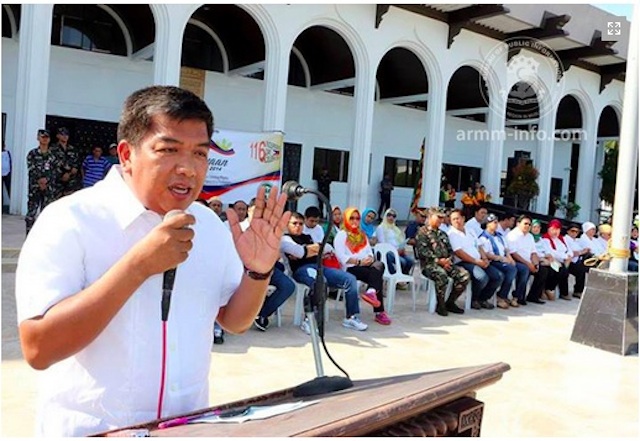
ARMM Governor Mujiv Hataman. Photo courtesy of armm.info.com
Bangsamoro pa rin di ba?” (I do not understand, maybe because I am younger, but what does the MNLF want that is not in accord with what the MILF wants? What does the MILF want that is different from what the MNLF wants? In the end, we’re still Bangsamoro, right?), he said.
Hataman reiterated that if what will make them unite is for him to resign tomorrow as ARMM Governor, he would do so. “Kahit bukas magre-resign ako magkaisa lang sila.”
“Alam ko yung limitation ng ARMM, ramdam ko na hindi ARMM ang solusyon sa problem ng Bangsamoro pero merong mga oportunidad na pwedeng gawin para mapakinabangan ng Bangsamoro habang nandyan ang ARMM. Pero definitely, hindi ito ang ultimate solution” (I know the ARMM’s limitations. I feel the ARMM is not the solution to the problem of the Bangsmaoro but htere are opportunies that we can do for the Bangsamoro to benefit from while the ARMM is there. But definitely, this is not the ultimate solution), Hataman said.
Maguindanao Governor Esmael Mangudadatu said he hopes the MNLF and MILF leaders “talk properly” for the sake of the Bangsamoro.
He said he is bothered by leaders calling the others as “traitors,” as Misuari said of the MILF and the other factions of the MNLF in November.
“Once upon a time, sila sila at sana hanggang ngayon sila pa rin para sa amin” (Once upon a time, they were for us and hopefully now, they will still be for us), he said.
“Just fitting in”
Duterte, however, is apparently working on how to “converge” or “harmonize” the MILF and MNLF-Misuari peace tracks, otherwise he would have two draft Bangsamoro laws to endorse to Congress — the BTC’s draft law and the MNLF-Misuari’s amending-the-ARMM law.
Duterte told the Federation of Filipino-Chinese Chambers of Commerce on March 24 in Manila that he was rushing to return to Davao City for a dinner meeting with “Misuari and other Moro leaders.”
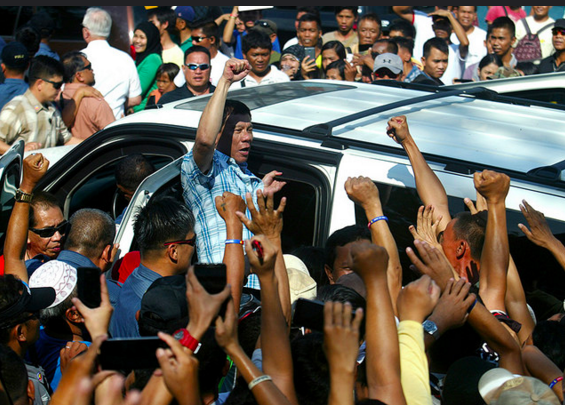
Davao CIty Mayor Rodrigo Duterte, the lone Mindanawon Presidentilal candidate, chants “Allahu Akbar” (Allah is Great) as he arrives at the venue of the Cotabato City rally on February 27, 2016. Duterte was warmly welcomed by the Moro people for whom he vowed his administration would “correct the historical injustice” done to them. MindaNews photo by KEITH BACONGCO
Earlier in the same speech, he said “ginagawa ko ang lahat” (I am doing everything). “I have been talking to Misuari, I already talked with him yesterday. ‘Yung Bangsa— ‘yung MI(LF), MN(LF) si Misuari. We are talking, we are crafting a sort of a preparatory document so that we can go into the process of proposing the federal structure.”
It is not clear what Duterte meant by a “preparatory document.”
There was no Duterte-Misuari dinner on March 24. The President met with Misuari behind closed doors at the Presidential Guest House in Panacan on March 27 but no details of the nearly hour-long meeting have been revealed.
Dureza told MindaNews he could not provide details as he was not in the meeting.
But Duterte hinted at what steps he was doing for the Bangsamoro. In a joint press conference with Pimentel Alvarez in Malacanang on March 13, Duterte said he was “just waiting for the Bangsamoro (Basic Law) draft” before he would set up the 25-member Consultative Committee that would study and make recommendations on amending the 1987 Constitution for the shift to a federal system.
He said he “asked the MI(LF) to hurry up,” apparently referring to the drafting of the BBL by the BTC.
Duterte explained Misuari is “taking his own sweet time but I can understand that. And maybe if he sees the draft, he cannot really co-mingle but just set it in para i-fine-tune na lang tutal yung basic demands nandiyan din sa kanya, nandito rin sa kabila (to fine-tune it, after all, the basic demands are also his, and also the MILF’s).
“So it’s a matter of just fitting it in, then fine-tune it to the satisfaction of everybody,” Duterte said.
Did he get Misuari to agree on “fitting in” during their March 27 meeting? Details of the meeting have not been divulged.
Expanding the political middle
Irene Santiago, chair of the goverment’s Peace Implementing Panel, acknowledges that it is “government’s responsibility to pass that law.”
She is optimistic it will pass soon. “It does not even occur to me that it will not be passed because all the elements are there and then you have hope and you have trust and that is the reason we celebrate the (3rd anniversary of the) CAB,” she told a press conference here Wednesday.
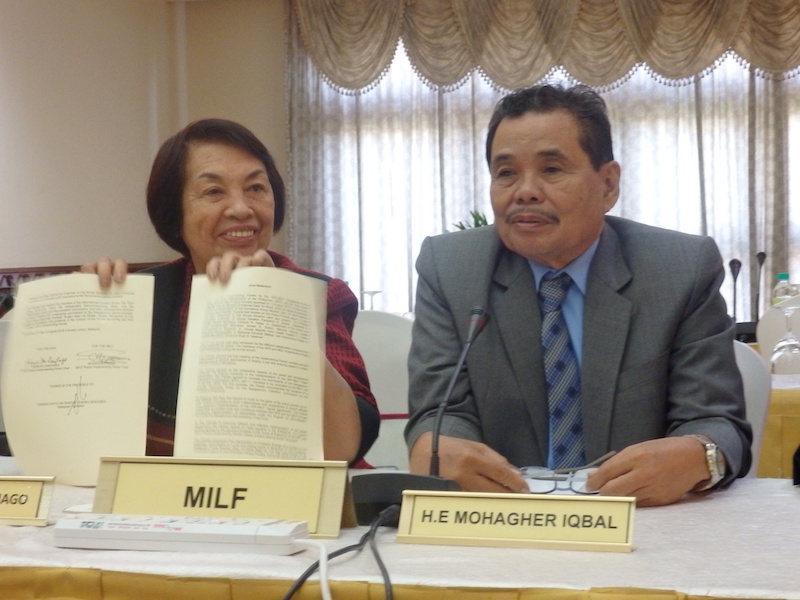
Irene Santiago, chair of the government’s peace implementing panel shows the two-page joint statement she signed with MILF’s peace implementing panel chair Mohagher Iqbal on August 14, 2016 during the launch of the implementation phase of the GPH-MILF peace process in Kuala Lumpur. MindaNews file photo by CAROLYN O. ARGUILLAS
She said they have engged the different committees in both houses of Congress “that would most probably take care of shepherding of the law — the committees on Peace, Muslim Affairs, among others.
She also revealed that government has engaged the services of experts at crafting language to help Congress in finding alternative language to provisions legislators may not like in the draft BBL, as well as a political stratesgist “who’s going to count the noses, count the votes.”
She expressed confidence in their “very realistic plan” in Congress because
“it is not just an advocacy group that goes there and lobbies, this is a professional lobbying effort that we have now put together.”
Santiago also said they engaged “a professional group that’s going to do our communications plan so that’s a very important part” and the peace tables that htey are organizing, she said, will not be like past consultations.
“The peace tables are going to expand the polticial middle becuase I don’t think we really engaged the other groups, so now we’re engaging Rotary, we’re engaging the the professionals, the civic groups, apart from religious groups and the the youth and the women, so it is really expanding that middle and looking for where the opinion leladers are and getting them to … It’s not a small group of people who has always done peace. It is really expanding that,” Santiago added.
http://www.mindanews.com/peace-process/2017/03/draft-bangsamoro-law-48-days-to-may-18-115-days-to-the-july-24-sona/

No comments:
Post a Comment
Note: Only a member of this blog may post a comment.